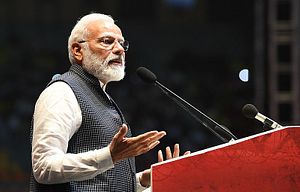Prime Minister Narendra Modi and his Bharatiya Janata Party (BJP) secured an astounding victory for a second term in office not long ago. In this lopsided election battle, which was supposed to be fierce, the issue of corruption took a back seat, overshadowed by national security and hardliner Hindu nationalism. This is unusual, though not entirely surprising, and contrasts with the election five years ago: a determination to eradicate rampant chronic corruption and replace it with a clean government was widely believed to be a key reason behind Modi’s first victory back in 2014. Two years later, when the high-profile demonetization was launched, it was also billed as an attempt to curb “black money” and reduce corruption.
Now that the election battle is over, should the Indian government under Modi’s second term resume the battle against corruption? Perhaps more importantly, given that the stakes are too high to answer “no” to the first question, how should the Modi government 2.0 do so?
At least three trends can help open new windows of opportunity for designing and implementing anti-corruption policies more effectively. To begin with, the prevalence of corruption in India saw some improvement during Modi’s first term, at least according to the Corruption Perceptions Index (CPI), a widely used, albeit imperfect, measurement. The improvement is remarkable especially when contrasted with India’s giant neighbor, China. Despite a similar determination to fight corruption and even a high-profile “tiger hunt” (chasing after high-ranking corrupt officials by the Central Commission for Discipline Inspection and its regional offices), China’s CPI has actually fallen from 40 in 2014 to 39 in 2018. While the increase for India from 38 to 41 in the index (meaning a cleaner government) during the same period may be attributable to a myriad of factors, it can at least give the government some leverage to pursue further endeavors.
Various approaches can be taken to consolidate this promising trend. Traditionally, India’s anti-corruption policies have been characterized by a heavy reliance on legislative and judicial bodies with substantial input from civil society — as exemplified by the passing of the Lokpal Act. Yet it should not be neglected that civil servants, as the bedrock of the administration, have a role to play too. They are an important group of stakeholders especially because of their dual role: both as the targets of anti-corruption policies and, inevitably, their implementers. This makes it even more imperative to understand their “insider perspectives.” In the first study to do so, in 2017, in-depth interviews conducted by researchers at the National University of Singapore and the Education University of Hong Kong suggest that a vast majority of respondents agree that corruption can be reduced by economic, social, and political “facilitators,” from lower income inequality to increase public awareness of corruption control.
Third, insofar as civil servants serve as important “insiders” in fighting corruption alongside the judiciary, the legislature, and the civil society by engaging in those economic, social, and political measures, the potential to utilize e-government is particularly high. Originally intended to increase the efficiency and effectiveness of government activities with the help of technological advancement, e-government is increasingly appreciated as an anti-corruption tool by increasing government transparency and public involvement. Over 70 percent of respondents agree that transparency and modern technology, the two key planks in the e-government agenda, play a role in reducing corruption in the same interviews mentioned above. According to these respondents, the anti-corruption effect of e-government is manifested through citizen vigilance, the removal of middlemen, the empowerment of the public, and so forth. These positive opinions are further joined by Modi’s recent praise of the “Digital India” initiative and reflected in successful cases from Gujarat and Karnataka.
These three trends create valuable and favorable starting points for the new government. To translate them into concrete results, the Modi government 2.0 nevertheless needs to bear in mind three critical lessons from corruption control in other developing countries.
First, political willingness clearly matters; however, anti-corruption should be “depoliticized.” To put differently, rather than treating anti-corruption as expedient for exorcizing political rivals, as India’s neighbors are perceived to be doing to varying degrees, the focus should really be put back on the corruption problem itself.
Second, despite the widely accepted usefulness of various anti-corruption facilitators, none of them would suffice if used alone. Therefore, the task underlying anti-corruption governance – or indeed any governance – is to devise a policy mix that can synergize the merits of different instruments while minimizing, if not cancelling out, their individual limitations.
Last but not least, especially for the adoption of e-government initiatives, innovative technology may well require that accessibility and quality of education be improved simultaneously so as to improve the usage of such technologies. The availability of information through e-government initiatives is similarly expected to be corroborated when improved equality reduces the demand for corruption through better access to public service. Conversely, public goods provision also needs to be supplemented with transparency measures so as to guarantee that it does not become a source of corruption itself.
The road to reduced corruption is never an easy one, both in India and elsewhere. Having said so, the fresh start after the election battle marks the perfect time for the new government to incorporate both positive trends and sober lessons available, and to confidently yet carefully craft out a resumed battle against corruption.
Yifei Yan, Ph.D., is an incoming Fellow for Social Policy at the London School of Economics.
Alfred M. Wu, Ph.D., is Assistant Dean & Associate Professor in Lee Kuan Yew School of Public Policy.

































